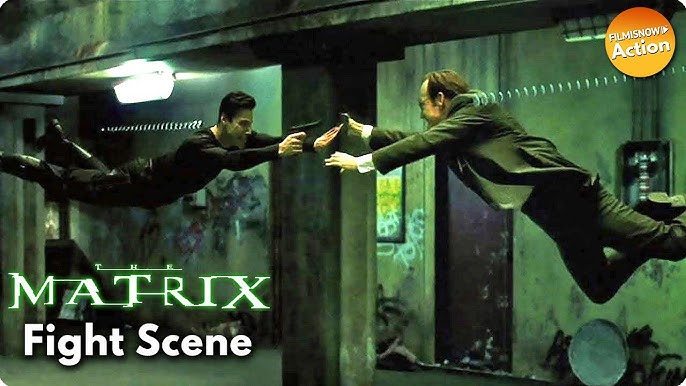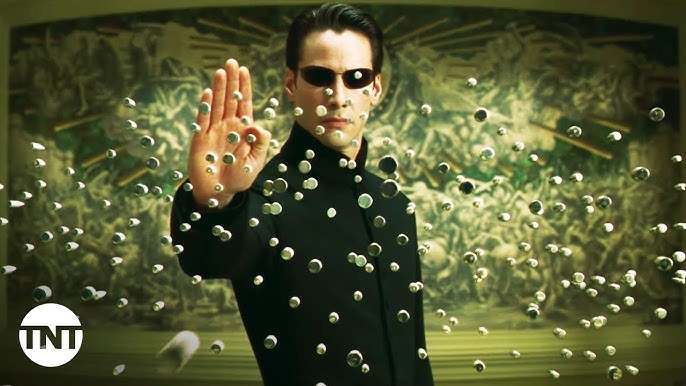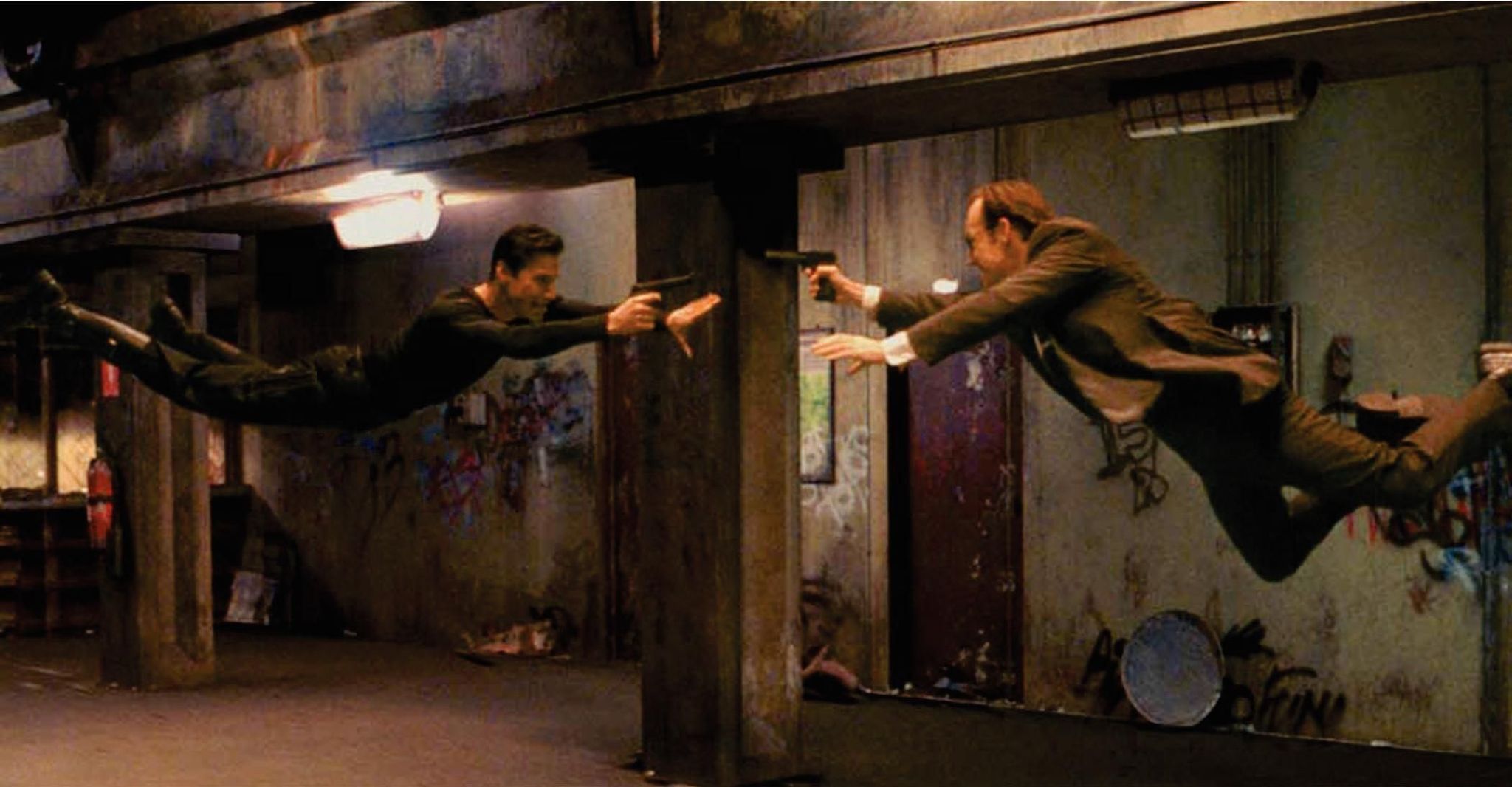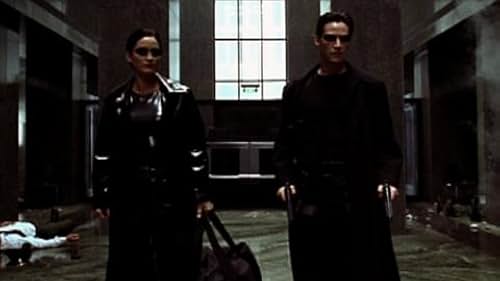🎬 The Matrix (1999)
- vansinh
- October 27, 2024

🎬 The Matrix (1999): A Mind-Bending Journey into Reality
The Matrix, directed by the Wachowskis, is a groundbreaking science fiction film that explores the nature of reality, consciousness, and human existence. Set in a dystopian future where humanity is unknowingly trapped within a simulated reality created by sentient machines, the film follows Thomas Anderson (Keanu Reeves), a computer programmer who leads a double life as the hacker known as Neo. Neo’s journey begins when he is contacted by the enigmatic Morpheus (Laurence Fishburne) and the fearless Trinity (Carrie-Anne Moss), who reveal the shocking truth about the Matrix and his potential role in the rebellion against the machines. 🌌🖥️

The film’s innovative visual effects and action sequences redefined the sci-fi genre, introducing iconic elements such as “bullet time,” which allows viewers to experience the world from a slow-motion perspective while the action unfolds around them. This stylistic choice not only enhances the thrilling combat scenes but also symbolizes the bending of reality that is central to the film’s themes. The choreography of the fight scenes, influenced by martial arts, adds a layer of intensity and fluidity that has since become a hallmark of action cinema. 🥋💥
At its core, The Matrix poses profound philosophical questions about the nature of reality and free will. The film draws on various influences, including cyberpunk literature, philosophy, and religious allegories, particularly the concepts of enlightenment and the hero’s journey. Neo’s transformation from an ordinary individual to “The One” who has the potential to save humanity serves as a metaphor for self-discovery and awakening to one’s true potential. The red pill/blue pill choice presented by Morpheus symbolizes the decision to confront uncomfortable truths or remain in blissful ignorance, making it a powerful moment in cinematic history. 🧠🔴🔵
 The performances in The Matrix are compelling, with Reeves embodying Neo’s evolution from a confused and disillusioned hacker to a confident leader. Fishburne delivers a powerful portrayal of Morpheus, a mentor figure whose unwavering belief in Neo’s potential drives the narrative forward. Moss’s Trinity is a fierce and skilled fighter, breaking gender stereotypes and providing a strong counterbalance to Neo’s character. The chemistry among the trio adds emotional depth to the film’s action-packed storyline. 🎭⚔️
The performances in The Matrix are compelling, with Reeves embodying Neo’s evolution from a confused and disillusioned hacker to a confident leader. Fishburne delivers a powerful portrayal of Morpheus, a mentor figure whose unwavering belief in Neo’s potential drives the narrative forward. Moss’s Trinity is a fierce and skilled fighter, breaking gender stereotypes and providing a strong counterbalance to Neo’s character. The chemistry among the trio adds emotional depth to the film’s action-packed storyline. 🎭⚔️
The film also features a memorable supporting cast, including Hugo Weaving as the sinister Agent Smith, whose relentless pursuit of Neo symbolizes the oppressive nature of the machine-driven reality. The philosophical implications of Smith’s character further explore themes of control, conformity, and the loss of individuality in a mechanized world. The film’s world-building is richly detailed, presenting a stark contrast between the bleak reality of the real world and the vibrant, albeit artificial, world of the Matrix. 🌆🤖
 Upon its release, The Matrix received critical acclaim for its innovative storytelling, visual effects, and philosophical depth. It won four Academy Awards and has since become a cultural touchstone, influencing countless films, video games, and works of art. The film’s iconic imagery, including the green tint that characterizes the Matrix and the memorable catchphrases, has permeated popular culture, cementing its legacy as a classic of modern cinema.
Upon its release, The Matrix received critical acclaim for its innovative storytelling, visual effects, and philosophical depth. It won four Academy Awards and has since become a cultural touchstone, influencing countless films, video games, and works of art. The film’s iconic imagery, including the green tint that characterizes the Matrix and the memorable catchphrases, has permeated popular culture, cementing its legacy as a classic of modern cinema.

In conclusion, The Matrix is a thought-provoking and visually stunning film that challenges perceptions of reality and identity. Its groundbreaking effects, engaging performances, and philosophical underpinnings make it a landmark achievement in the science fiction genre. With its timeless themes and compelling narrative, The Matrix continues to resonate with audiences, inviting them to question the nature of their own reality.











